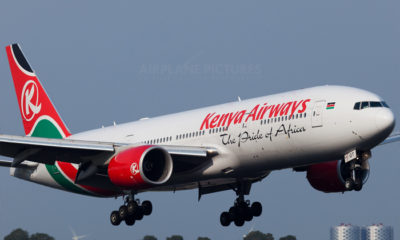Markets
Digital Finance to Add $3.7tr to Emerging Economies’ GDPs
Published
8 years agoon

- Digital Finance to Add $3.7tr to Emerging Economies’ GDPs
It is estimated that digital finance could add about $3.7 trillion to emerging countries’ gross domestic product (GDP) by 2025, if is widely adopted, and represents a six per cent increase above business as usual.
In low-income countries with very low financial inclusion rates, such as Nigeria, Ethiopia, and India, GDP could increase by as much as 12 per cent. Financial inclusion facilitates the delivery of financial services at affordable costs to sections of disadvantaged and low-income segments of society.
Through digital finance, access to financial services can be expanded to other sectors, including agriculture, transportation, water, health, education, and clean energy.
However, entrepreneurship, investment and economic growth suffer when savings are stored outside the financial system, and credit becomes scarce and expensive.
Fortunately, a recent report by the McKinsey Global Institute (MGI), said digital technologies especially with mobile phones can rapidly fix this problem and foster faster, more inclusive growth.
Mobile phones and the Internet are believed to be capable of reducing the need for cash and bypass traditional brick-and-mortar channels like banks.
MGI said this dramatically reduces financial-service providers’ costs, and makes their services more convenient and accessible for users – especially low-income users in remote locations.
The report informed that digital finance can boost GDP in several ways. Nearly two-thirds of the expected growth would come from increased productivity, because businesses, financial-service providers, and government organisations would be able to operate much more efficiently if they did not have to rely on cash and paper recordkeeping.
Another one-third would come from increased investment throughout the economy, as personal and business savings were moved into the formal financial system, and then mobilised to provide more credit. The remaining gains would come from people working more hours – the time they would have spent travelling to bank branches and waiting in queues.
As for financial inclusion, digital finance has two positive effects. First, it expands access. In emerging markets in 2014, only about 55 per cent of adults had a bank or financial-services account, but nearly 80 per cent had a mobile phone. That 25-percentage-point gap could be closed by making mobile banking and digital wallets a reality.
But a gender gap will also have to be closed: worldwide, about 200 million fewer women than men have mobile phones or Internet access.
Secondly, digital finance reduces costs: MGI estimates that it would cost financial-service providers 80-90 per cent less – about $10 per year, compared to the $100 per year it costs today – to offer customers digital accounts than accounts through traditional bank branches.
Understandably, using purely digital channels thus makes it feasible to meet the needs of low-income customers. Financial inclusion becomes profitable for providers even when account balances and transactions are small.
With digital finance, as many as 1.6 billion unbanked people – more than half of whom are women – could gain access to financial services, shifting about $4.2 trillion in cash and savings currently held in informal vehicles into the formal financial system.
According to MGI, this would allow for an additional $2.1 trillion to be extended as credit to individuals and small businesses.
It disclosed that businesses could also save on labour costs to the tune of 25 billion hours yearly, by swapping cash transactions for digital payments. And governments could take in an additional $110 billion yearly– to invest in growth-enhancing public goods like education – because digital channels make tax collection cheaper and more reliable.
To bring this to fruition in Nigeria, experts in Nigeria’s ICT space have called for accelerated broadband deployment and availability of smart phones.
Speaking to The Guardian on phone, the President, National Association of Telecommunications Subscribers of Nigeria (NATCOMS) Chief Deolu Ogunbanjo, described the news as a good one for Nigeria.
Ogunbanjo said Nigeria needed to get its National Broadband Plan (NBP) moving, stressing that the country must do everything to go digital.
He advised government to ensure that the planned data price hike never materialise, “as this will definitely prevent so many people from coming online,” adding that subscribers are ready to go digital any time.
On his part, the Director-General, Delta State Innovation Hub (DSIHUB), Chris Uwaje, noted that there are many angles to the MGI’s report, which include the need to create jobs and improve the level of national infrastructure.
Uwaje, a former President of the Institute of Software Practitioners of Nigeria (ISPON), said it can be deduced from the report that smart phone will take over the reins of things as far as digital transformation is concern.
He said digital economy speaks to all youth, saying the process will enable Nigeria to drive financial inclusion.
According to him, we still import innovation and technology in Nigeria, “it has become important for us improve on our local content development. Digital economy is a basket, people will put in money and some will utilise it. It is a nation that creates that will benefit most.”
Uwaje said Nigeria must establish a technology bank, which will be able to sponsor innovations and others. He said the MGI report is looking at creativity.
Meanwhile, the report citing Kenya as example, noted that new mobile-money services are already demonstrating digital finance’s potential. For instance, M-Pesa, which transforms one’s phone into a mobile wallet – has leveraged powerful network effects to bring about a vast expansion in the share of adults using digital financial services.
It disclosed that the share grew from zero to 40 per cent in just three years, and had risen to 68 per cent by the end of last year.
However, for improved performance, across board, everyone needs a mobile phone with an affordable data plan. While businesses can help, the Institute posited that it is incumbent upon governments and non-governmental organisations to extend mobile networks to low-return areas and remote populations.
Besides, it said that governments must also ensure that networks between banks and telecommunications companies are interoperable; otherwise, widespread use of mobile phones for financial services and payments would be impossible.
Governments must establish universally accepted forms of identity as well, so that service providers can control fraud.
In emerging economies, one in five people are unregistered, compared to only one in ten in advanced economies. Nearly 20 per cent of unbanked women in emerging countries do not have the documentation necessary to open a bank account. Even when people have recognised identities (IDs), they must be amenable to digital authentication. Digital IDs that use microchips, fingerprints, or iris scans could prove useful and are already gaining popularity in emerging economies.
According to it, it is also important for governments to implement regulations that strike a balance between protecting investors and consumers, and giving banks, retailers, and financial-technology and telecommunications companies room to compete and innovate.
“Because regulations often shut out non-bank competitors, governments should consider a tiered approach, whereby businesses without a full banking license can provide basic financial products to customers with smaller accounts. A good model for this is the United Kingdom’s “regulatory sandbox” for financial-technology companies, which imposes lower regulatory requirements on emerging players until they reach a certain size.
“Financial inclusion is vital for inclusive economic growth and gender equality, and it has assumed a prominent role in global development efforts, with the World Bank aiming for universal financial inclusion by 2020. With billions of people in emerging economies already using mobile phones, digital finance makes this goal achievable,” MGI stated.
Is the CEO and Founder of Investors King Limited. He is a seasoned foreign exchange research analyst and a published author on Yahoo Finance, Business Insider, Nasdaq, Entrepreneur.com, Investorplace, and other prominent platforms. With over two decades of experience in global financial markets, Olukoya is well-recognized in the industry.

You may like
-
Nigeria Considers Creation of 31 New States Despite Economic Challenges
-
Visa Denial Sparks Airport Drama as Kenya Airways Defends Staff
-
Nigeria Seeks $15bn Investment to Revamp Power Sector, Offers Higher Tariffs
-
Nigeria’s Economy Shows Signs of Recovery with December PMI at 51.0
-
Nigeria Joins BRICS as Partner Country, Strengthening Global South Cooperation
-
70 Million Poorest of The Poor Nigerians To Get N75,000 From FG















